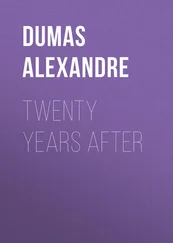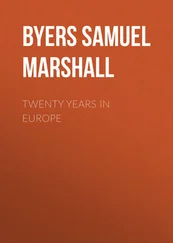"Is it only the guilty whose honor is at the sport of others, sir? and cannot women be dishonored by appearances? Yes, appearances were against me and I was about to suffer dishonor. However, I swear I was not guilty, I swear it by―"
The queen looked around her for some sacred object by which she could swear, and taking out of a cupboard hidden in the tapestry, a small coffer of rosewood set in silver, and laying it on the altar:
"I swear," she said, "by these sacred relics that Buckingham was not my lover."
"What relics are those by which you swear?" asked Mazarin, smiling. "I am incredulous."
The queen untied from around her throat a small golden key which hung there, and presented it to the cardinal.
"Open, sir," she said, "and look for yourself."
Mazarin opened the coffer; a knife, covered with rust, and two letters, one of which was stained with blood, alone met his gaze.
"What are these things?" he asked.
"What are these things?" replied Anne, with queen–like dignity, extending toward the open coffer an arm, despite the lapse of years, still beautiful. "These two letters are the only ones I ever wrote to him. This knife is the knife with which Felton stabbed him. Read the letters and see if I have lied or spoken the truth."
But Mazarin, notwithstanding this permission, instead of reading the letters, took the knife which the dying Buckingham had snatched out of the wound and sent by Laporte to the queen. The blade was red, for the blood had become rust; after a momentary examination during which the queen became as white as the cloth which covered the altar on which she was leaning, he put it back into the coffer with an involuntary shudder.
"It is well, madame, I believe your oath."
"No, no, read," exclaimed the queen, indignantly; "read, I command you, for I am resolved that everything shall be finished to–night and never will I recur to this subject again. Do you think," she said, with a ghastly smile, "that I shall be inclined to reopen this coffer to answer any future accusations?"
Mazarin, overcome by this determination, read the two letters. In one the queen asked for the ornaments back again. This letter had been conveyed by D’Artagnan and had arrived in time. The other was that which Laporte had placed in the hands of the Duke of Buckingham, warning him that he was about to be assassinated; that communication had arrived too late.
"It is well, madame," said Mazarin; "nothing can gainsay such testimony."
"Sir," replied the queen, closing the coffer and leaning her hand upon it, "if there is anything to be said, it is that I have always been ungrateful to the brave men who saved me—that I have given nothing to that gallant officer, D’Artagnan, you were speaking of just now, but my hand to kiss and this diamond."
As she spoke she extended her beautiful hand to the cardinal and showed him a superb diamond which sparkled on her finger.
"It appears," she resumed, "that he sold it―he sold it in order to save me another time—to be able to send a messenger to the duke to warn him of his danger—he sold it to Monsieur des Essarts, on whose finger I remarked it. I bought it from him, but it belongs to D’Artagnan. Give it back to him, sir, and since you have such a man in your service, make him useful."
"Thank you, madame," said Mazarin. "I will profit by the advice."
"And now," added the queen, her voice broken by her emotion, "have you any other question to ask me?"
"Nothing,"—the cardinal spoke in his most conciliatory manner—"except to beg of you to forgive my unworthy suspicions. I love you so tenderly that I cannot help being jealous, even of the past."
A smile, which was indefinable, passed over the lips of the queen.
"Since you have no further interrogations to make, leave me, I beseech you," she said. "I wish, after such a scene, to be alone."
Mazarin bent low before her.
"I will retire, madame. Do you permit me to return?"
"Yes, to–morrow."
The cardinal took the queen’s hand and pressed it with an air of gallantry to his lips.
Scarcely had he left her when the queen went into her son’s room, and inquired from Laporte if the king was in bed. Laporte pointed to the child, who was asleep.
Anne ascended the steps side of the bed and softly kissed the placid forehead of her son; then she retired as silently as she had come, merely saying to Laporte:
"Try, my dear Laporte, to make the king more courteous to Monsieur le Cardinal, to whom both he and I are under such important obligations."
5.
The Gascon and the Italian.
Meanwhile the cardinal returned to his own room; and after asking Bernouin, who stood at the door, whether anything had occurred during his absence, and being answered in the negative, he desired that he might be left alone.
When he was alone he opened the door of the corridor and then that of the ante–chamber. There D’Artagnan was asleep upon a bench.
The cardinal went up to him and touched his shoulder. D’Artagnan started, awakened himself, and as he awoke, stood up exactly like a soldier under arms.
"Here I am," said he. "Who calls me?"
"I," said Mazarin, with his most smiling expression.
"I ask pardon of your eminence," said D’Artagnan, "but I was so fatigued―"
"Don’t ask my pardon, monsieur," said Mazarin, "for you fatigued yourself in my service."
D’Artagnan admired Mazarin’s gracious manner. "Ah," said he, between his teeth, "is there truth in the proverb that fortune comes while one sleeps?"
"Follow me, monsieur," said Mazarin.
"Come, come," murmured D’Artagnan, "Rochefort has kept his promise, but where in the devil is he?" And he searched the cabinet even to the smallest recesses, but there was no sign of Rochefort.
"Monsieur d’Artagnan," said the cardinal, sitting down on a fauteuil, "you have always seemed to me to be a brave and honorable man."
"Possibly," thought D’Artagnan, "but he has taken a long time to let me know his thoughts;" nevertheless, he bowed to the very ground in gratitude for Mazarin’s compliment.
"Well," continued Mazarin, "the time has come to put to use your talents and your valor."
There was a sudden gleam of joy in the officer’s eyes, which vanished immediately, for he knew nothing of Mazarin’s purpose.
"Order, my lord," he said; "I am ready to obey your eminence."
"Monsieur d’Artagnan," continued the cardinal, "you performed sundry superb exploits in the last reign."
"Your eminence is too good to remember such trifles in my favor. It is true I fought with tolerable success."
"I don’t speak of your warlike exploits, monsieur," said Mazarin; "although they gained you much reputation, they were surpassed by others."
D’Artagnan pretended astonishment.
"Well, you do not reply?" resumed Mazarin.
"I am waiting, my lord, till you tell me of what exploits you speak."
"I speak of the adventure—Eh, you know well what I mean."
"Alas, no, my lord!" replied D’Artagnan, surprised.
"You are discreet—so much the better. I speak of that adventure in behalf of the queen, of the ornaments, of the journey you made with three of your friends."
"Aha!" thought the Gascon; "is this a snare or not? Let me be on my guard."
And he assumed a look of stupidity which Mendori or Bellerose, two of the first actors of the day, might have envied.
"Bravo!" cried Mazarin; "they told me that you were the man I wanted. Come, let us see what you will do for me."
"Everything that your eminence may please to command me," was the reply.
"You will do for me what you have done for the queen?"
"Certainly," D’Artagnan said to himself, "he wishes to make me speak out. He’s not more cunning than De Richelieu was! Devil take him!" Then he said aloud:
Читать дальше
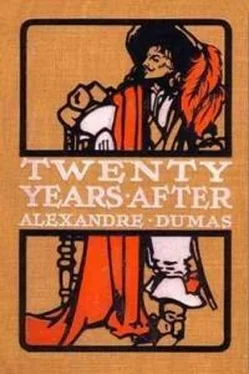
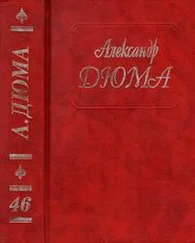
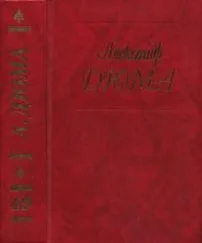


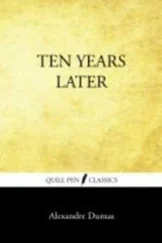
![О Генри - Через двадцать лет [After Twenty Years]](/books/415401/o-genri-cherez-dvadcat-let-after-twenty-years-thumb.webp)



